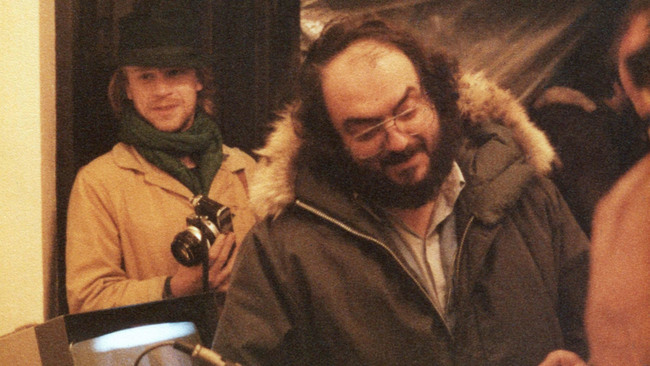Cannes 2017: Tony Zierra’s Filmworker

“The film industry is full of unassuming figures quietly holding everything together without ever demanding a share of the limelight,” begins Gwilym Mumford in the Guardian.Filmworker, a “tender documentary” premiering in the Cannes Classics program, “makes time to profile one of them: Leon Vitali, the man who walked onto a Stanley Kubrick set in 1973 and never walked back off. Cast as Lord Bullingdon, the callow, vicious stepson in the director’s peerless period piece Barry Lyndon, Vitali found himself so enthralled by Kubrick’s working methods that he jettisoned a promising acting career to become his right-hand man, a role he remained in up to the auteur’s death and beyond.”
“Vitali recalls playing a role in everything from the casting of the Diane Arbus twins in The Shining to inspecting perhaps 500 prints of Eyes Wide Shut,” notes Ben Kenigsberg at RogerEbert.com. “Friends describe him as a jack of all trades who became adept at many different levels of the filmmaking process; it's unheard-of to find an acting coach (a now-grown-up Danny Lloyd remembers Vitali fulfilling that role for him on The Shining) who can also color-time a 70-millimeter print. . . . Although it's great to hear Vitali's insights into Kubrick's personal manner—he suggests the director ran hot and cold on people with a chess player's eye toward the end result—this is fundamentally the story of two men, and having only Vitali alive to talk to leaves the documentary with a lack of balance.”
“Recently,” writes Variety’s Owen Gleiberman, “a lot of Kubrickiana has begun to seep out of the woodwork, some of it gathered into termite-art documentaries like Stanley Kubrick’s Boxes (about his vast collection of memorabilia) or S Is for Stanley (about Kubrick’s relationship with his long-time Italian chauffeur and personal assistant). Filmworker is the best of these films yet. Directed, shot, and edited by Tony Zierra, it’s a portrait of Kubrick’s right-hand man, who devoted himself to the religion of all things Kubrick, but beyond that the film has a special value: It ushers you into the world of how Kubrick put his movies together.”
“Filmworker (which also features interviews from Ryan O’Neal, Matthew Modine and others) will be catnip to Kubrick obsessives who have worn out their copies of documentaries such as Stanley Kubrick: A Life in Pictures,” suggests Tim Grierson in Screen. At the same time, “Vitali, although knowing Kubrick intimately for decades, doesn’t necessarily have fresh insights into the man. That Kubrick could be incredibly exacting and ill-tempered—and that, at other times, he could be exceedingly kind and supportive—is not a revelation.”
“What were the costs of this devotion on Vitali himself?” asks Stephen Farber in the Hollywood Reporter. “That is one of the most provocative questions posed by the film, though there is no definitive answer. . . . He had fairly prominent positions on two Todd Field movies—In the Bedroom and Little Children—so the impression conveyed by the film that he had no professional life after Kubrick is probably inaccurate or incomplete.”
Steven Zeitchik talks with Vitali for the Los Angeles Times and adds: “Hollywood biopics can pull a muscle trying to tell us the crazed devotion that art requires. Filmworker effortlessly shows it.”
Update, 5/21:Bilge Ebiri has a good long talk with Vitali for the Village Voice. After discussing the ways that they both feel that Kubrick has been misunderstood, they turn to the unrealized projects. Kubrick “never made any indication to us at all that we were not looking for actors for A.I.,” says Vitali. “Because we were. He wanted to do another science fiction.”
Updates, 5/26: “In time, you come to believe that Vitali really is unfailingly devoted to realizing his mentor's vision,” writes Simon Abrams for RogerEbert.com. “It really is as simple as Kubrick's idea of professionalism: ‘you either care, or you don’t.’ . . . To make Vitali's obsessive drive look like more than just a selfless mission from an unsung cinematic saint, director Tony Zierra does what so few documentary filmmakers think to when they make talking-head docs: he asks follow-up questions. And he talks to as many people as he can find who knew, or can shed light on his subject. And he asks them pointed questions that holistically paint a portrait of Vitali as an extension of Kubrick's legendary single-mindedness.”
“Ultimately, Filmworker isn’t actually about Kubrick, even if Vitali still considers himself to be working for his longtime boss and mentor eighteen years after his death,” writes Michael Nordine at IndieWire. “Though notoriously difficult to please, Kubrick would likely keep his eyes wide open throughout Filmworker; those who knew both men might argue that the film shows even more appreciation for Vitali than Kubrick did.
Update, 7/4: “I wish that Zierra had gone into a little detail about the questionable decisions around the HD transfers of Kubrick’s films that appeared in the Blu-ray box set,” writes Kent Jones in Film Comment, “but his film is lively, funny, and a little disturbing.”
Cannes 2017 Index.For news and items of interest throughout the day, every day, follow @CriterionDaily.



